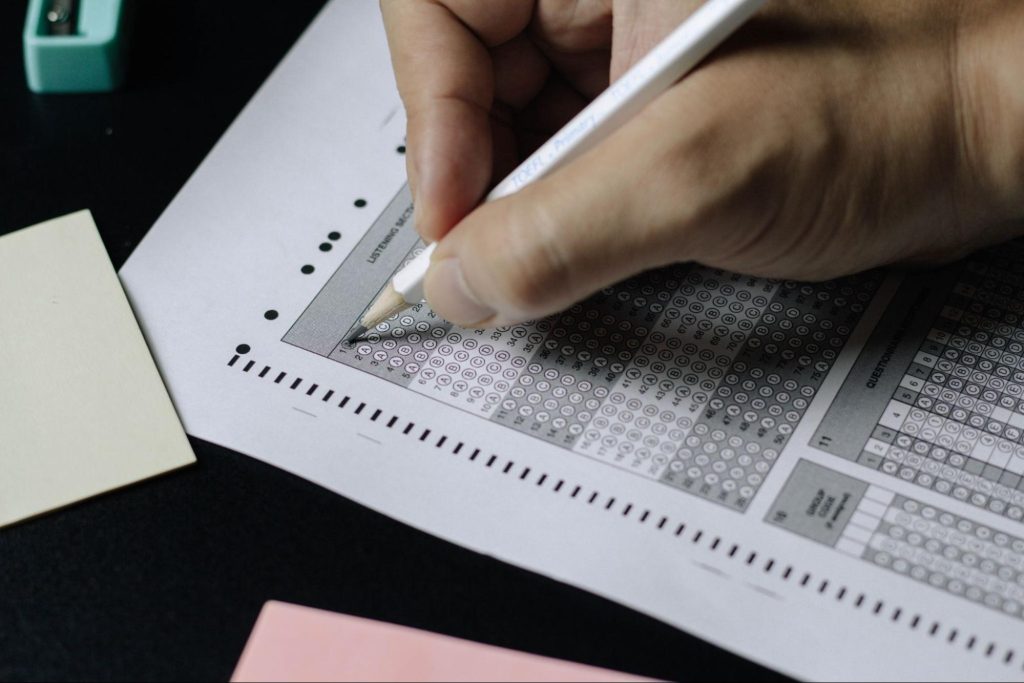
“I will never learn German”— that phrase hit me right in the face. Recently my college friend reminded me how many years ago while sitting in our college cafeteria, I said that I would never learn German. Fast forward to the future, and you will find me learning German, preparing for the Goethe-Zertifikat test: Start Deutsch 1, and getting ready to MOVE to Germany. It’s crazy, right? Well, God has particular ways of doing things.
Taking a language test like the Goethe’s can be intimidating, especially if you need to pass it in order to get a new job or move abroad.
This post will give you all the information you need to prepare for and ace the Goethe German A1 Test.
Let’s get started!

What is the Goethe-Zertifikat test?
The Goethe-Zertifikat is an exam designed to measure proficiency in the German language. It is based on the six-level scale of the Common European Framework of Reference for Languages (CEFR).
This evaluation was created by the Goethe Institute, an organization that promotes knowledge of the German language and culture internationally.

Goethe-Zertifikat test: Start Deutsch 1
According to the Goethe-Institut, “The Goethe-Zertifikat A1: Start Deutsch 1 is a German exam for adults. It certifies that candidates have acquired very basic language skills and corresponds to the first level (A1) on the six-level scale of competence laid down in the Common European Framework of Reference for Languages (CEFR).” goethe.de
I had to take this test to fulfill all the requirements for a residence visa to move to Germany. Without this certification, my application would have been rejected without a doubt.

Structure of the Test
The exam consists of 4 parts: Listening, reading, writing, and speaking.
For the test, you will receive a booklet and an answer sheet. This booklet contains numerous activities designated for the different parts of the exam. However, the most important point is that you HAVE to fill out the answer sheet. At first, you can cross the answers in the booklet, but it’s crucial to transfer all of them to the sheet. Otherwise, you will lose those points.
The first section of the exam is listening (Hören), which lasts approximately 20 minutes. In the three exercises, you will hear short conversations and announcements with multiple-choice options, which test gist and scan listening skills. The objective is to complete the exercises according to the information provided in the audio.
Next is the reading test (Lesen), which lasts around 25 minutes, and is divided into three parts. This section measures your reading comprehension and ability to scan for information. First, you’ll read short letters, advertisements, e-mails, signs, tickets, etc. Afterward, you must complete the tasks (true or false/multiple choice) for every text.
The third part of the test is writing (Schreiben), it lasts 20 minutes, and you need to fill out a form and write a short text (letter, e-mail, or message).
Lastly, we have the speaking test (Sprechen), which takes 15 minutes plus to complete. The speaking section also has three parts and will be conducted in groups. First, you have to introduce yourself and answer the questions asked by the examiner. The second part involves asking for and giving information. The third and final task is to make requests and respond to them. The examiner will show different cards that contain an image or a keyword. Each candidate will receive a card and must formulate a question for their partner related to the keyword in the prompt.
“A maximum of 100 points may be earned – 75 points on the written exam and 25 points on the oral exam. The exam is deemed to have been passed if at least
60 points (60 % of the maximum point score) have been earned and if all sections of the exam have been completed.” goethe.de
Here is a sample booklet of the Goethe-Zertifikat test: Start Deutsch 1, provided by Goethe Institute’s website. It will give you an idea about the structure of an actual exam.
Now that we know the format comes the crucial part—preparation.

German A1 Level Content
What do you need to learn to achieve an A1 level in German?
This is a pdf with the Menschen Kursbuch A1 content, which can serve as a reference for the topics you should study.
The German A1 level includes:
- Self-introduction
- Personal pronouns and verbs in the present tense
- The alphabet & numbers
- The articles: der/die/das/
- Languages and countries
- Verbs
- Living & home furnishings
- Prepositions of time
- How to form negatives
- People and hobbies
- Prepositions of place
- Occupations/workplace
- Indicators of space
- Directions
- Food and drink
- Personal pronouns in the accusative case
- The seasons and the weather
- Sentence connectives: conjunctions
- Travel
- Adjectives
- Transportation
- Health
- And more…
The Goethe Institute recommends a variety of study books from different publishers (although most of them cover almost the same subjects). Whichever guide you choose, be sure to go through all the content included in this level. You don’t want to fall short and then be surprised during the exam by a topic you have never seen.

Pre-Test Preparation
First of all, it’s essential to define your “why.” Why do you want to pass this test? Write it on a post-it note and put it where you can see it daily. Your reason will keep you going when you feel frustrated and want to give up.
Create a Road Map
If you want to achieve a goal, you need a plan. Are you going to take a course, work with a tutor, or study on your own? Will you study daily or only on the weekends? Are you going to use a textbook or online material? You need to define a strategy; if not, you will be overwhelmed by all the options available out there.
Set a Time Limit
How much time are you willing to spend studying? How much time do you have to prepare for the test?
You can do it in a year or three months. Of course, not everybody goes at the same speed, but one thing is for sure – we all need to be consistent. Define when you will take the test, set a study schedule, and stick to it. If you don’t, you will not be ready by the time you need to be.
Self-study, Tutor, or a Course?
This depends on the person. My approach was mixed. I used the Menschen A1 series and covered two units per week — concepts, vocabulary, grammar, etc. I would study and complete the workbook exercises, then meet my tutor for two hours during the weekends. I received corrections, practiced, and clarified any doubts in that meeting. This study method allowed me to progress at the pace I needed.
However, you don’t have to follow my study plan; you can go faster or slower, take a course, or self-study. I know plenty of people who have studied independently, using only online resources, and passed the test successfully. Therefore, choose the method that works for YOU.

How to Prepare for the Actual Test
Listening
For this part of the exam, it’s essential to train the ear. Both books and online platforms have several audio resources that you can use to refine your listening skills. Also, YouTube is a good source for audio exercises similar to the ones used in previous exams.
Reading
To prepare for this section, there’s no way around it; you have to read. Practice reading short stories, letters, emails, dialogues, and so forth. Imagine that someone is going to ask you specific information about that text, and be prepared to answer any question that might come up.
You can use previous test sample booklets (available online) to practice. Also, I recommend the book: Easy German Dialogues: Fun & Simple Conversation Practice For Beginners And Intermediates. It has a series of dialogues and exercises that are extremely helpful in improving your reading comprehension and vocabulary.
Writing
Keep a journal where you write simple texts about different topics in German. It will help you to structure your ideas with simplicity and clarity.
There are multiple writing exercises available on YouTube. For example, search for Schreiben Goethe Zertifikat A1, and you will find countless videos to practice this part of the exam.
Speaking
Preparing for the previous sessions will give you a solid foundation for this part of the exam. However, you need to practice your output regularly.
Ideally, it would be nice to have someone to practice with, but if you don’t, that should not hold you back. Memorize your self-introduction, and practice so much that you can say it automatically. There are videos like this: Start Deutsch 1 Sprechen A1; watch as many as possible to exercise how you respond to questions.

5 Tips to Manage Time Effectively During the Test
1–Read the questions first. Always ensure you know what you are looking for, whether it is the listening, reading, or writing section. This way, you can focus on finding the answer within the audio or the text.
2–If you don’t understand something, keep going. Don’t waste time focusing on a question or word you don’t understand; move forward until you finish. Then, go back and try to resolve that issue.
3–Do not rush. Breathe and carefully read all the requirements of each assignment.
4- Focus. Make sure you complete all the tasks correctly.
5- Never leave early. If you finish before the time is up, stay in your seat. Take this time to review your exam and ensure that every answer is transferred to your answer sheet. Sometimes we leave too soon and then remember the answer to a question we might have forgotten due to stress.
Facing a new challenge can be overwhelming. This process comes with many doubts and expectations, but don’t get disheartened. If you put in the effort and prepare properly, passing this test will be a walk in the park, I promise.
Viel Glück bei der Prüfung!
Tschüss!–You‘ve been reading a guest post by Génesis Villar
